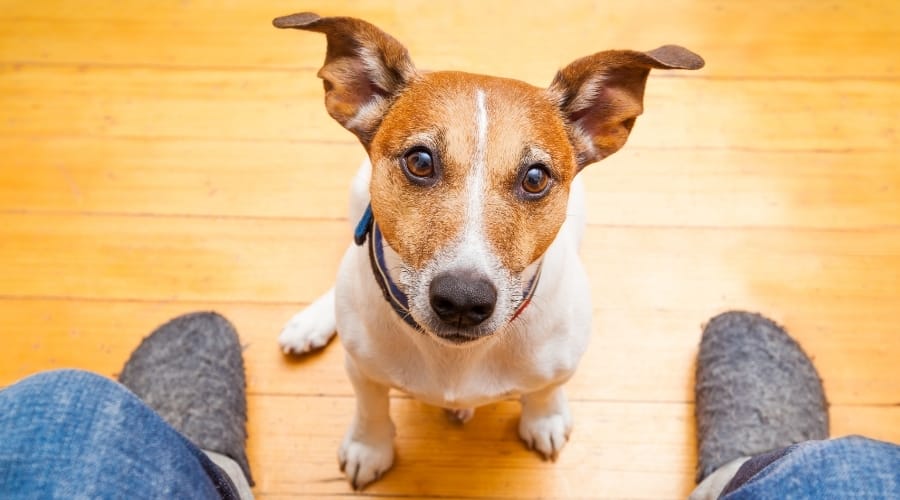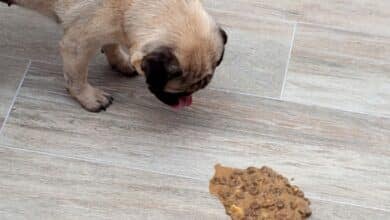Dog Grinding Their Teeth Like A Stressed-Out Accountant In April? Here’s What It Means
When you purchase through links on our site, we may earn a commission. Here’s how it works.
Is your dog producing sounds reminiscent of a midnight tax crunch—clenching their jaw, grinding their teeth, and appearing unusually tense? While this behavior might seem quirky or amusing, teeth grinding in dogs—known as bruxism—can signal underlying issues ranging from dental discomfort to gastrointestinal distress or even anxiety.
Table of Contents
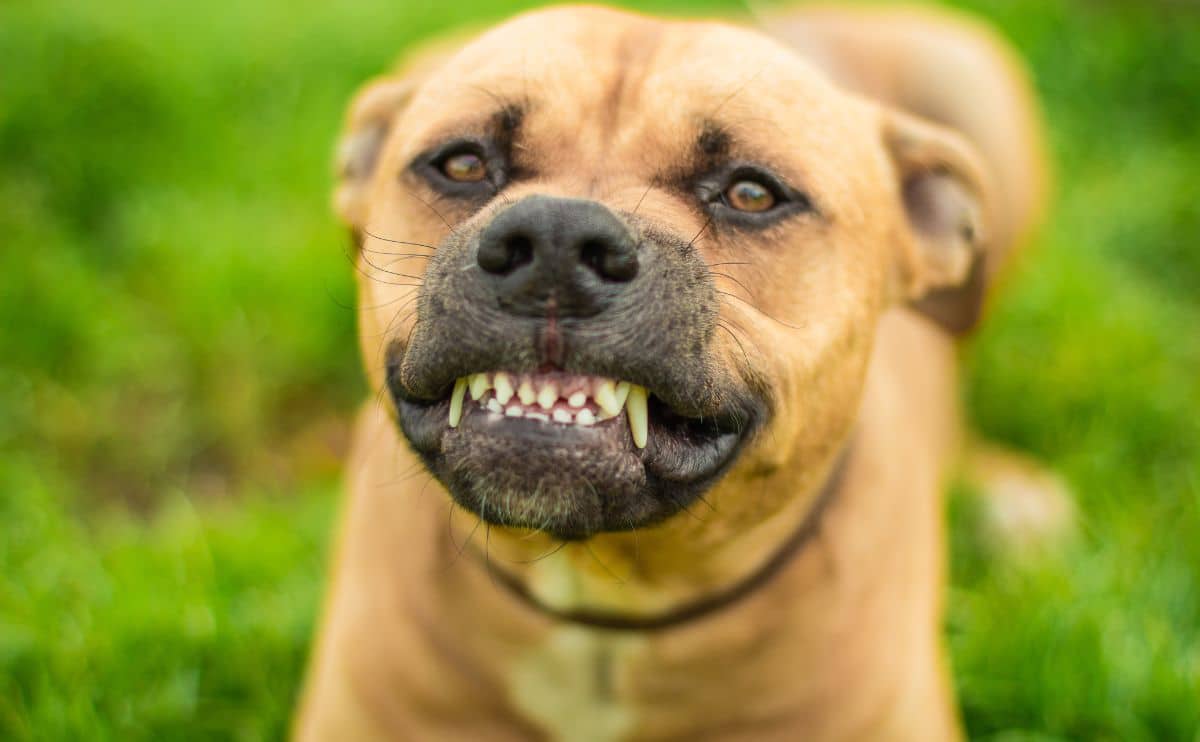
Occasional grinding might not raise immediate concerns, but if your canine companion frequently engages in this behavior or displays signs of discomfort, it’s essential to delve deeper. Understanding the root causes, recognizing when to seek veterinary advice, and exploring potential remedies can help ensure your dog’s well-being and comfort.
Bruxism: Not Just A Human Problem
Dogs don’t have work deadlines or awkward Zoom calls, but they can still suffer from bruxism—the fancy term for teeth grinding. In dogs, this usually means clenching or rubbing their teeth together, sometimes making a clicking or crunching noise that can be surprisingly loud.
While it might seem like an oddball behavior, bruxism can lead to real problems—like worn-down enamel, jaw soreness, or worsening dental issues—if left untreated. So, even though it’s not common in all dogs, it’s worth paying attention when it does happen.
Why Is My Dog Grinding Their Teeth Like That?
If your dog sounds like they’re trying to chew invisible bubblegum, you’re probably wondering what’s happening. Teeth grinding can be caused by several underlying issues, and it’s usually not just a weird little habit.
Some of the most common reasons include:
- Dental problems: Broken teeth, misalignment, or infections can cause your dog to grind in response to pain.
- Stomach trouble: Nausea or GI discomfort can trigger bruxism, especially after meals.
- Stress or anxiety: Just like people clench their jaws when tense, dogs sometimes grind to cope with emotional stress.
- Jaw or nerve issues: Less common, but neurological problems or jaw tension could be the culprit.
Whatever the cause, it’s your dog’s way of saying something isn’t quite right.
When To Worry: Teeth Grinding That Deserves A Vet Visit
A little nighttime jaw movement might not mean much—but when the grinding becomes regular or intense, it’s time to pay closer attention.
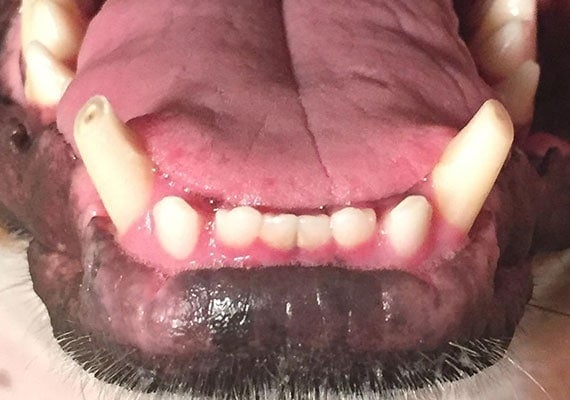
Call your vet if you notice:
- Your dog grinding daily or for long stretches
- Refusing to eat or chewing differently
- Drooling more than usual
- Pawing at their face or acting like their mouth hurts
- Sudden mood changes—like being snappier or less active
If your dog’s stress levels or pain are high enough to mess with their mouth, it’s time to find out why.
Teeth Grinding & Bad Breath: When It’s More Than Just Gross
If your dog’s grinding comes with a side of foul breath, it’s time to pay attention. Foul-smelling breath paired with bruxism often points to a deeper issue, especially if you notice new black spots on your dog’s tongue or gums.
While some pigmentation is standard, new, large, or irregular spots—combined with bad breath and grinding—should prompt a vet visit.
Here are a few possible causes:
- Periodontal disease: One of the most common culprits. Infected gums and decaying teeth can cause pain, jaw tension, and seriously bad breath.
- Oral tumors: These can produce a rotten meat odor and may also lead to pain-induced grinding.
- Liver disease or failure: This can cause foul-smelling breath alongside vomiting, diarrhea, yellowing of the eyes, and appetite loss.
- Kidney failure: Often linked to advanced dental disease and produces a strong, chemical-like smell.
- Diabetes: Dogs with uncontrolled diabetes may have sweet-smelling breath, and the extra jaw movement could be a sign of discomfort or nausea.
- Heart disease: Bad breath, pale or bluish gums, and labored breathing can indicate a cardiovascular issue.
While this isn’t an emergency, bad breath combined with teeth grinding is a red flag—and the sooner you catch the underlying cause, the better the outcome.
What The Vet Says
Bruxism often occurs because of an underlying dental or medical issue. It may not seem like a big deal at first, but over time, grating the jaws against each other can wear down the enamel and dentin, weakening dental health and even leading to broken teeth.
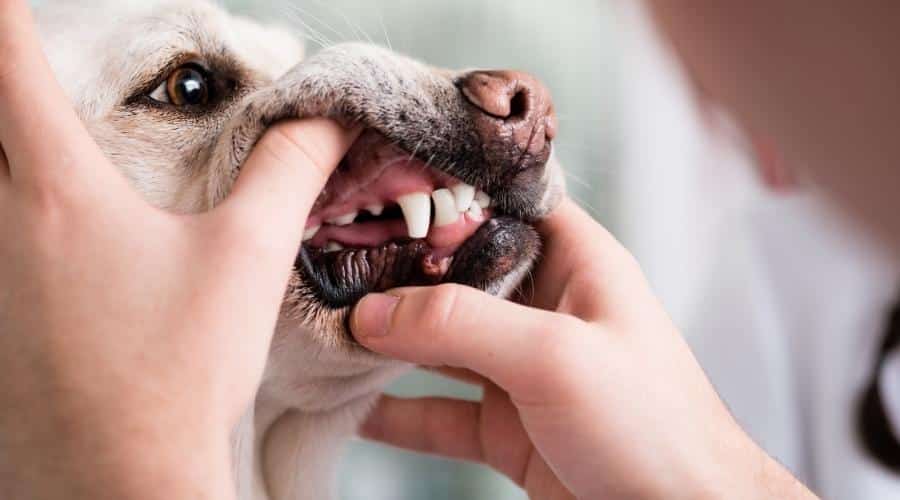
“Teeth grinding is not uncommon in dogs,” explains veterinarian Dr. Sarah-Jane Molier, BSc BVM&S MRCVS. “While oral or dental pain is the most common reason for dogs to grind their teeth, I also see a lot of dogs grinding their teeth due to abdominal (tummy) pain.”
She shares a case that might sound familiar:
“I saw a puppy in consult recently who was grinding their teeth. The owner had believed that she was teething, so left it a while before coming to see me. In fact, the puppy had a rather nasty worm burden! Once we treated the worms and gave her guts some TLC (in the form of probiotics), she was much happier and stopped grinding her teeth,” says Molier.
Dr. Molier also points to other, less common causes—including malocclusion (misaligned teeth), anxiety, and focal seizures. But no matter the cause, her advice is clear:
“In order to stop your dog from grinding their teeth, you will need to see your vet,” says Molier. “Unless the underlying cause is treated, the symptom won’t improve, and the ongoing grinding of the teeth can cause serious dental wear.”
Could It Be Stress? (Yes, Dogs Get Anxious Too)
Dogs may not have to deal with inboxes or in-laws, but that doesn’t mean they’re immune to anxiety. And just like people, dogs can physically manifest stress—through pacing, whining, or grinding their teeth.
Common stress triggers:
- Changes in routine
- Loud noises (looking at you, fireworks)
- Separation from their humans
- New pets or houseguests
If your pup’s teeth grinding seems to come out of nowhere, especially during travel, storms, or when left alone, anxiety might be the underlying cause.
Calming aids, puzzle toys, and behavioral therapy can all help—and in some cases, medication might be worth exploring with your vet.
How Vets Diagnose Dog Bruxism
When you bring your dog to the vet for teeth grinding, here’s what might happen:
- Oral Exam: Checking for broken or infected teeth, gum disease, or malocclusion (bad bite)
- X-rays: Especially if jaw or tooth root pain is suspected
- Bloodwork: To rule out systemic issues like liver disease or kidney trouble
- Neurological screening: In rare cases, to look for seizures or nerve-related causes
It might sound like a lot, but the goal is to rule out anything serious—and get your dog relief ASAP.
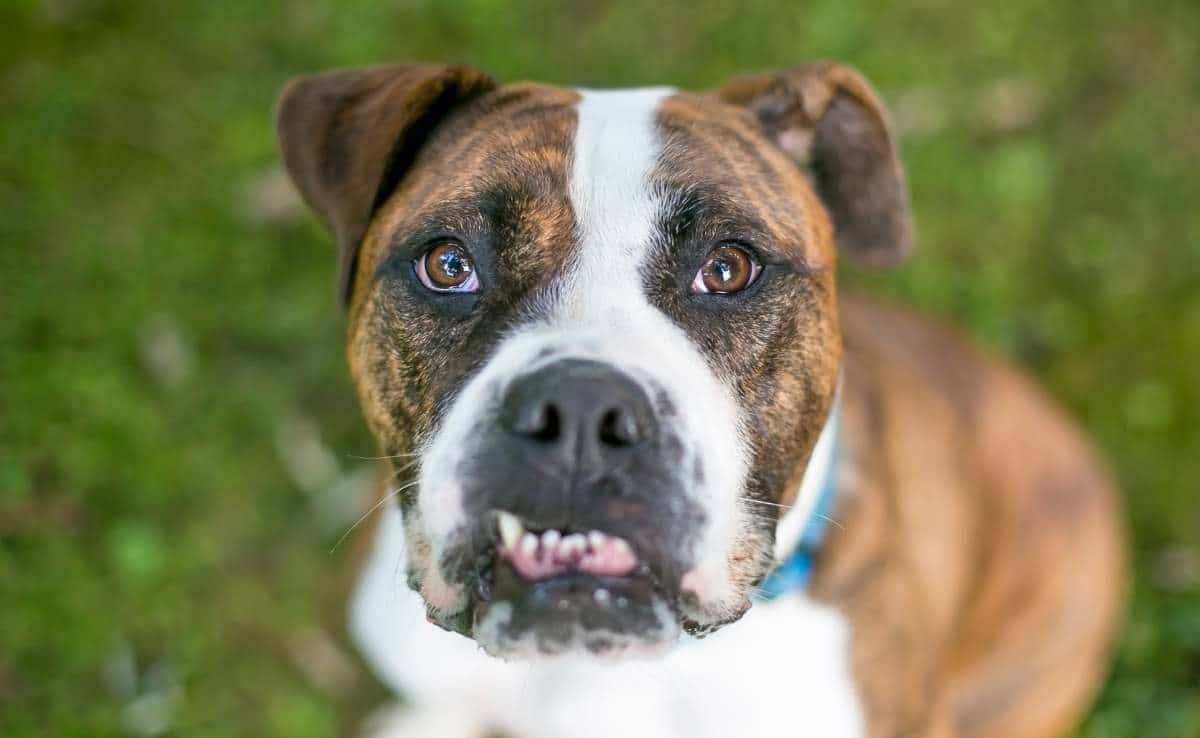
How To Help Your Dog Stop Grinding Their Teeth
Treatment becomes more targeted once your vet figures out what’s causing the grind. Depending on the cause, solutions might include:
Dental Disease
- Professional cleaning
- Medications for infection or inflammation
- Tooth extraction, if necessary
- Braces in rare cases (yes, dog braces exist!)
GI Issues Or Abdominal Pain
- Diet changes
- Anti-nausea or pain medications
- Deworming treatments
- Surgery (if something more serious is discovered)
Anxiety Or Stress
- Modify the environment to remove triggers
- Use pheromone diffusers or calming supplements
- Consider a professional trainer or veterinary behaviorist
- Explore techniques like desensitization, enrichment, and behavior modification
- In some cases, anti-anxiety medications may be helpful
At-Home Support
- Give your dog plenty of safe chew toys to redirect the grinding
- Use dental chews for pups with bad breath or early-stage dental plaque
- Keep up with regular tooth brushing and dental cleanings
- Monitor for subtle symptoms—especially during sleep or rest when grinding might be more frequent
Pro Tip: If you notice your dog grinding, do a quick mouth check. Look for swelling, bleeding, chipped teeth, or anything unusual. Subtle signs like licking the lips, avoiding food, or seeming “off” can also be clues.
Bruxism might seem minor at first glance—but it’s rarely meaningless. Work closely with your vet to rule out severe conditions, treat what’s necessary, and make changes at home to keep your pup comfortable and pain-free.
Grinding at Night? Try This
Nighttime grinding could be tied to stress, poor sleep setup, or lingering pain. Try:
- A soft, orthopedic dog bed or anti-anxiety dog bed
- A relaxing bedtime routine (think treat, snuggle, chew toy)
- White noise or calming music for dogs
- A vet-approved calming supplement if nighttime anxiety is common (try CBD oil for dogs, which can be helpful for both pain and anxiety)
A few tweaks can go a long way in helping your pup snooze without the soundtrack.
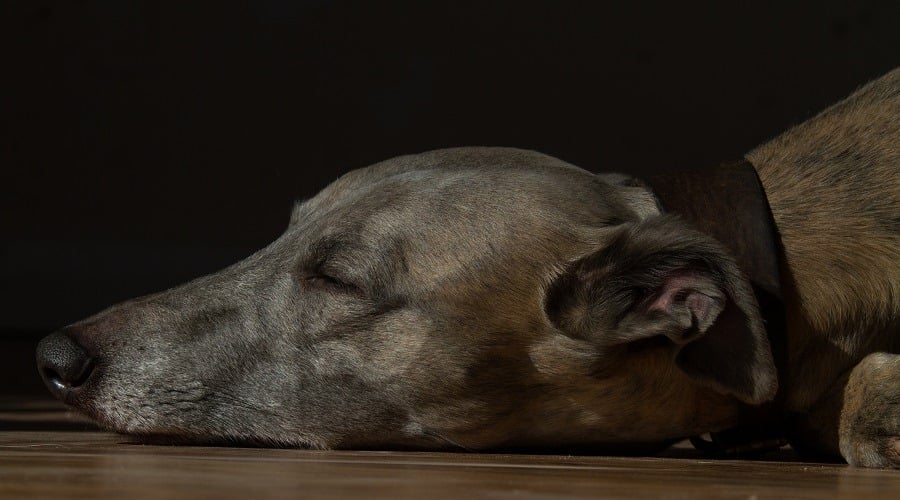
Frequently Asked Questions
Still have questions about what your dog’s jaw-clenching might mean? You’re not alone.
Below are answers to some of pet parents’ most common concerns when they notice their dog grinding their teeth—whether during sleep, after a yawn, or out of the blue. Don’t see yours? Ask us your question in the comments!
Is Teeth Grinding In Dogs Always A Sign Something’s Wrong?
Not always—but it’s usually a symptom of an underlying issue. Occasional or light grinding may happen without a serious cause, especially during sleep or moments of stress.
If the grinding is frequent, loud, or paired with other changes (like drooling, appetite loss, or behavioral shifts), it’s likely signaling pain, discomfort, or anxiety. It’s best to consult your vet to rule out any medical or dental conditions.
Why Does My Dog Grind Teeth After Yawning Or Settling Down?
Many dogs grind their teeth during quiet, relaxed moments—like right after yawning, when settling into bed, or as they start to fall asleep. This often happens involuntarily and is commonly associated with oral or dental pain, such as sore gums or a cracked tooth.
The discomfort may also stem from abdominal pain, gastrointestinal upset, or other internal discomforts. Grinding can be a subconscious response to stress or pain; when dogs are relaxed, they’re more likely to let that response show.
If you notice this behavior regularly, especially at rest, it’s worth discussing it with your vet to identify the root cause.
Can Bruxism Go Away On Its Own?
Sometimes, yes—if the cause is temporary or stress-related, like a change in routine or minor GI discomfort. In those cases, the grinding may stop once the stressor is gone. But if the grinding persists or worsens, it’s a strong sign there’s something deeper going on that needs medical attention.
What Happens If I Ignore It?
Chronic grinding can cause significant dental damage, including worn-down enamel, exposed nerves, and even fractured teeth. It can also allow an underlying medical issue to worsen.
Left untreated, the behavior can cause your dog pain and discomfort—not to mention pricey dental work later on.
Are Some Breeds More Prone To Teeth Grinding?
Brachycephalic (short-nosed) breeds like Bulldogs, Pugs, and Boxers are more likely to have misaligned jaws, which can lead to bruxism. Toy breeds may also be at higher risk due to their small mouths and dental crowding.
That said, bruxism can happen to any dog, regardless of breed, especially if there’s pain involved.
Prevent Dental Disease in Dogs
Teeth grinding is often just the tip of the iceberg when it comes to canine oral health. If you’re noticing foul breath, plaque buildup, or want to prevent long-term dental problems, be sure to check out our guide to gum disease in dogs—including how to spot the signs early and what treatment involves. And if you’re looking for ways to make dental care more affordable, our breakdown of pet dental insurance can help you understand your options before an emergency strikes.
Why Trust Canine Journal?
Danielle has shared a special bond with dogs since childhood. She has over 30 years of experience with dogs of all sizes and dogs with special needs. Danielle is a dedicated professional researcher and pet product reviewer. She spends countless hours researching the latest pet care, health, food, and training developments to help owners learn what’s behind the label. Her two dogs, Daisy and Falkor, serve as in-house food and toy testers. Danielle works with a professional and experienced team to bring the best, most accurate, and most up-to-date information to our readers.
